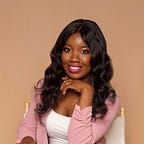Nice Girls Don’t Live Their Best Lives
I still remember the day that someone told me, “you’re so nice” in middle school. I took it as a compliment because being nice was a good thing, right?
I embraced this comment because I knew I was naturally a kind, empathetic, person, who tried not to hurt others’ feelings or put others down — all good traits, right? However, not long after I received this “compliment,” I found my kindness being abused. Since that time, several other people have told me that I was “so nice,” followed by their expectation that I will be their doormat.
These situations forced me to evaluate my “niceness.” As a result, I discovered that this “niceness” was rooted in my need to be viewed as a good person, to not ruffle any feathers, but rather, keep my environment copacetic. But, at what cost? I had asked myself, as I tried to unclog my chest of the resentments built up over the years from things left unsaid because I was trying to be “nice.”
My need to be “nice” caused my relationships (both platonic and intimate) to suffer because I was not being my true self, but instead, pretending to be okay, while keeping hurts bottled deep inside. I am sure the people around me at the time were tired of hearing my victim stories after my proclivity towards “niceness” resulted in me not speak up for myself. I was in search of someone to rescue me from this “niceness” but no one ever came.
Eventually, I decided to rescue myself. I no longer wanted to be a part of this “niceness” that had taken over my life. My stomach could not take any more crap! I tried to distance myself from this “niceness,” only to realize that it had become a part of me, the “nice girl” followed me where ever I went. After a few failed attempts, I realized that in order to rid myself of this “nice girl” once and for all, I had to discover how she came to be. In doing so, it became clear that although I am naturally a kind person, as a child, this “nice girl” had been programmed inside of me — distorting my understanding of what it meant to be myself.
Growing up, I was taught that speaking up and defending myself was the trait of a “bad girl.” I can still remember being told, “stop talking back,” when in my opinion, I wasn’t doing anything wrong, I was just trying to express my dissatisfaction with what was being said to me or how it was being said. The message I received was that speaking up for yourself was wrong — and so, the censorship began. The “nice girl” began rearing her ugly head to save me from the stigma of being a “bad girl.” The “nice girl” knew how to remain quiet, while inside, the words that she refused to let escape my mouth found residency in my chest. No one had to censor her, she censored herself before anyone else could. She seemed agreeable to others, so I allowed her to take control, year after year, until the unsaid words that filled my chest allowed no space for me, the me I was born to be.
Once I discovered how the “nice girl” came about, I began the arduous process of detoxing myself of this “nice girl.” I am still a work in progress, as I am learning how to act based on how I feel, no longer concerning myself with what others will think. If they want to label me a “bad girl,” go right ahead — your labels don’t define me. Who cares if someone does not like what I have to say? If what I am saying is my truth and is not coming from a place of malice, I will say it! If I truly don’t want to do something, I won’t do it!
Please don’t misinterpret this post as my declaration that I have now decided to become an asshole because that is not the case. As I have mentioned previously, I am naturally a kind person and I will continue to be myself. However, I now know that my view of what it means to be a kind person was warped by this ridiculous “nice girl” identity that I imposed on myself. It pains me to think of all the foolishness I put up with in the past because I was chasing this preposterous identity.
I write this post in hopes that it will inspire those who can relate to start the process of finding your true selves, and not living a passive life. At the end of the day, we only have one life to live, so LIVE YOUR BEST LIFE!
For me, living my best life means that I am choosing to be an active participant in my life. Gone are the days that I suppress my true self because I want to please others or prove that I am a good person. What people think of me is none of my business. Also, I have vowed to stop playing the victim, waiting for someone to save me, because I now know that everything I need to live the life that I want is within me.
